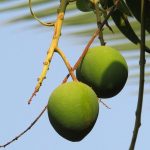African mango, scientifically known as Irvingia gabonensis, is a fruit native to the rainforests of West and Central Africa. This nutrient-rich fruit has been traditionally used in African medicine for centuries, and modern research has uncovered its impressive health benefits. From weight management to improved heart health, African mango is a natural superfood that deserves a place in your healthy lifestyle.
**Weight Management**
African mango is renowned for its ability to promote weight loss and reduce body fat. Its active ingredient, igolide, has been shown to inhibit the production of leptin, a hormone that signals the brain to store fat. By reducing leptin levels, African mango helps suppress appetite and cravings, making it easier to stick to a healthy diet. Additionally, it contains fiber, which promotes satiety and supports healthy digestion.
**Blood Sugar Control**
African mango has also shown promise in managing blood sugar levels. Studies have found that it can improve insulin sensitivity, which is essential for regulating blood sugar. This makes African mango a potential dietary supplement for individuals with type 2 diabetes or those at risk of developing it. By controlling blood sugar levels, African mango can help prevent insulin resistance and its associated health risks.
**Heart Health**
African mango contains antioxidants and anti-inflammatory compounds that may benefit heart health. It has been found to lower cholesterol levels, particularly low-density lipoprotein (LDL) cholesterol, which is the "bad" cholesterol that contributes to plaque buildup in arteries. Additionally, African mango may improve blood flow and reduce blood pressure, further protecting against cardiovascular diseases.
**Anti-Inflammatory Properties**
Chronic inflammation is linked to various health conditions, including heart disease, obesity, and cancer. African mango contains antioxidants and anti-inflammatory compounds that may help combat inflammation throughout the body. These compounds have been shown to reduce markers of inflammation, improving overall health and well-being.
**Antioxidant Activity**
African mango is rich in antioxidants, which protect the body against harmful free radicals. Free radicals are unstable molecules that can damage cells, contributing to aging and chronic diseases. The antioxidants in African mango neutralize free radicals, reducing oxidative stress and protecting cells from damage.
**Other Benefits**
In addition to the health benefits mentioned above, African mango has also been associated with improved sleep, reduced stress, and enhanced mood. It is believed to contain compounds that support the production of serotonin, a neurotransmitter that promotes relaxation and well-being.
**How to Enjoy African Mango**
African mango is typically consumed as an extract or dietary supplement. It can be found in capsule or powder form and is often added to smoothies, shakes, or other beverages. The recommended dosage varies depending on the specific product, so it is important to follow the instructions provided by the manufacturer.
**Conclusion**
African mango is a versatile superfood with a wide range of health benefits. Its ability to support weight management, improve blood sugar control, protect heart health, and reduce inflammation make it a valuable addition to any healthy lifestyle. Whether you are looking to lose weight, improve your heart health, or simply enhance your overall well-being, African mango is a natural superfood worth considering.

